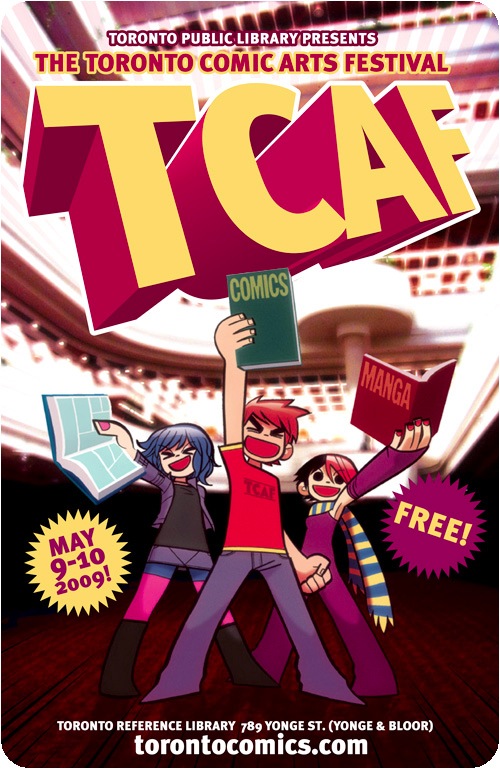On Facebook, retailers/ convention organizer Chris Butcher stated:
A thing I think is important is that we have a vital, healthy series of expos/festivals/conventions to promote and support comics creators, particularly people doing art or alt comics, particularly people doing good work. It’s why I run TCAF.
And on Twitter, he asked
“So, let’s say you are a comic (book/web/novel) creator, and you do small shows (Stump/Spx/Mocca/TCAF/local cons). Let’s say. Let’s say that tomorrow, the point of those shows went from whatever they currently are, to “let’s make comics creators a lot of money.” So instead of fundraising, enriching the artform, etc., it was just “exhibitors at our show need to make $$$”. What changes would need to happen? If you are a creator, what behaviours by shows do you feel are costing you money? Answer freely, it won’t affect exhibiting at my show.”









That’s always been the mission at SPACE. We honestly haven’t accomplished it but we try.
Seems like institutionalizing TCAF on Free Comic Book Day does a disservice to the exhibitor.
It seems counter-intuitive that TCAF is hoping guests will spend money on exhibitor’s products when there is a huge amount of books available for free that day.
It’s not the smaller shows that hurt us, with their low priced tables, as much as something like San Diego, where they keep raising the small press price. It is still small press with print runs of less than 500 books! How are we supposed to absorb that cost? As for having your show during free Comic book day, do you offer all the free shwag at TCAF? That would be nice. Overall the most constructive things I’ve heard from other exhibitors is timing of the convention. Making sure it doesn’t have to compete with some other type of social event that weekend. Then, location. Make sure people can get to the show. I’ve heard people complain about lack of public transportation to some of the smaller shows and being able to get a room for the time you are there. I think those are the three biggest obstacles for me to make money at a show. Not necessarily anything at the show but, cost of participation, location and timing.
Hope I helped,
Wahab
The most important thing about running a profitable show is getting the audience through the door. Typically, comic events are marketed towards people who already read comics, which is hit or miss for creators who don’t make superhero comics – because that’s what the established comics readers tend to like.
A more creative solution would be to spend a few months ahead of time establishing an audience through a comics salon (or similar mechanism) designed to educate potential readers on the fact that other genres exist. That way, when the time for the convention rolls around, there is a larger potential audience – an audience who probably doesn’t have that many comics already but is eager for more.
I can think of a couple of things. First, let’s recognize that small press comics, self-published comics, mini-comics, etc., aren’t available in comic stores, with occasional exceptions. Therefore, for a given small press show, while promotion is important, sales are just as important if not more so. They might be the ONLY sales you ever get in that particular city. And yet, these shows are designed around promotion–you buy a booth or table, you have artists present, etc.
Let’s posit a show in Middleville called the Middleville Comics Art Festival, or MCAF. If a small publisher buys a table and shows up, she gets decent sales and excellent promo. But what’s the value of that promo? The new fans she has gained don’t have a local store where they can buy her comics, because comic stores just don’t carry her stuff. And the promo part of it is expensive–it means flying out there and getting a hotel and buying tables and meals.
Given this, it would be better for her to use MCAF as just a sales opportunity–a “pop-up” art comics store. Except that MCAF won’t let her do it–for her to participate, she has to buy a table and have someone man it. In short, she is forced to do both the promo functions and the sales functions even though the promo function is probably wasted effort.
How could MCAF set it up differently? It could get rid of the promo aspect by eliminating the convention structure (i.e., tables/booths). The “festival” would be art exhibits, artists talks, workshops, etc. And the merchandise selling part would be, quite simply, a pop-up store that exists for a weekend or two as part of MCAF. Our small press publisher could participate in the pop-up store for far less money than actually attending a con would cost. The pop-up store would be part of MCAF and benefit from the publicity of MCAF. The cost to the small publisher (some slotting fee, I guess, and shipping) would be nominal but the potential sales would be just as high as buying a table at a more traditional con-style MCAF.
Fluke was always profitable for us. Probably because of how small it is. This year it was in a small music venue and bar. Tables were first-come, first-serve and cost only 8 dollars. At Fluke we would easily make just as much as we made at SPX with only a fraction of the table cost.
Everyone wants growth but maybe keeping shows small is the answer. Fluke is trying out preregistration this year. They are also talking about having an October show in addition to the one in April. Maybe having smaller shows more often will be the answer. I hope OktöberFLUKE is super successful this year!